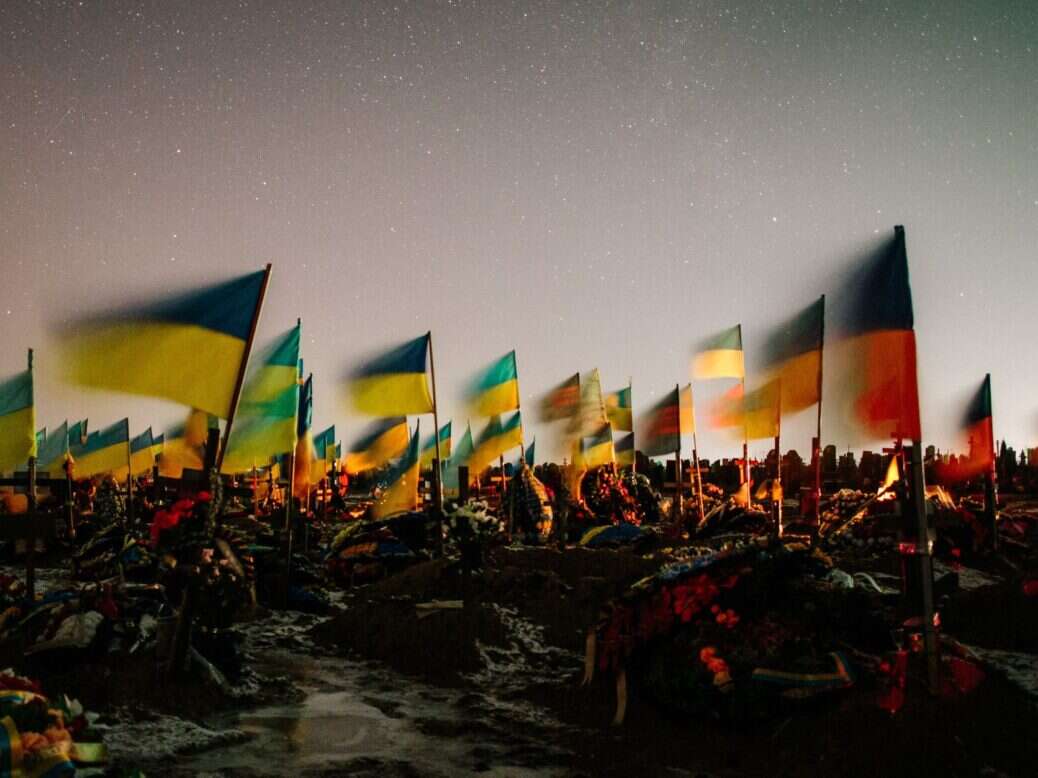
“They actually did it,” I wrote in my diary on 24 February 2022, my hands shaking from both the cold eastern European winter and a huge dose of adrenaline coursing through my veins. “Russia invaded Ukraine and I’m in Mariupol. Well, it was nice knowing me.”
I arrived in Ukraine in the first week of January amid US warnings of a Russian invasion and headed to the front line in the east before settling for over a month in Mariupol. I wrote near-daily reports on a city on the edge of danger, 20km from Russia and 10km from the line of contact with proxy forces.
Editors were desperate for stories of fear and panic from a country set to be invaded any day, but what I found instead was stoic calm. Few believed Russia would come, and those that did thought it would pass easily, just as a brief occupation of the city had in 2014. It didn’t make for very catchy headlines.
I was one of the only international journalists to remain in Mariupol after the invasion, but regular missile attacks and editors’ safety fears meant it was difficult to report. Russian troops were closing in, the sound of fighting was growing louder each day, and some said the city had already been cut off. A neighbour screamed “Welcome Russia!” from their window into the cold night sky – by day four, it was time to leave.
We – me, two Czech journalists and a Turkish photographer – escaped out of the last open checkpoint in Mariupol, manned by a single Ukrainian soldier who warned that he had no idea what lay ahead. “Watch out for mines,” he said, “and Russians.”
Freelancing is tough. It’s soul-destroying, confidence-shattering, mentally-destructive tough. Budgets are low, commissions can be hard to come by, and news desks rarely offer much logistic or emotional support. The risk of things going wrong when you’re out in the world on your own is high and over the last two and a half years as a freelance reporter, I’ve had my fair share of stupid situations.
I was trapped alone for weeks in Covid-19 isolation in Armenia on a strict diet of yoghurt and brown bulgar, made all the more difficult because I’m allergic to dairy. I’ve hitchhiked with over-friendly strangers over mountains in a late-night blizzard in Nagorno-Karabakh and spent hundreds of pounds on isolation in Romania over Christmas after catching Covid-19 (again) at an anti-vax rally. I was forced to leave my home, all my belongings and cat behind when I was deported from Turkey.
I can’t keep track of how many glasses of cheap wine I’ve cried into while trying to file my second or third story of the day. There are few moments, however, that make you question your life choices more than when faced with either a confrontation with Russians or taking your chances in Mariupol with what looked set to be a brutal siege. The Ukrainian government later estimated 25,000 people died there.
In those early days of the invasion, it seemed like nowhere in Ukraine was safe and everywhere was the front line. As we drove out of Mariupol and down deserted roads, crisscrossed with fresh tank tracks and past burned-out cars, nearby towns were falling to the Russians. Soldiers rushed to fortify cities against possible attacks, digging trenches and dragging Czech hedgehogs into the road.
We stopped in Dnipro, believing it to be the nearest safe city. Little did I know I’d still be based there almost a year later. I have watched the city change from a tense ghost town, where Russian saboteurs were being arrested in the street, to a vital aid hub. One of the greatest gifts of being freelance is the freedom to stay.
Over the last year, I’ve covered everything from the liberations of Kharkiv and Kherson, with their mass graves and torture chambers, to a possible nuclear meltdown, power outages and civilian life in Donbas before and after the war. I’ve produced stories for Foreign Policy, The Sunday Times, The Guardian, Al Jazeera, AFP and Newlines, as well as TV for Channel 4 News and a long read for The Economist’s 1843.
Staying means having the time to understand the nuance and complexities of this horrible war. If more British outlets had based correspondents in Ukraine, we would see far more depth from coverage and much less sensationalism. If there’s one thing I’ve learnt, it’s that catchy headlines aren’t everything.
It would be disingenuous to pretend it’s been easy. Ukraine is hard work. Access to sensitive areas and information can be almost impossible at times without the money to buy the right help. Curfews, power cuts and a lack of nutritious food in some areas can take their toll and, while freelancing gives you freedom, like all good things, it comes with a price.
A lot is expected of freelances, usually for little return. Being a freelance is to be expected to have the best ideas and to execute them with no budget, while being told you should have contacts at every institution, speak the language(s) and have your own car. It’s being ditched somewhere because a TV crew offered your fixer double rate and it’s sleeping on a floor while staff from newspapers that won’t cover expenses stay in the best hotels.
Yet, being a freelance is also the satisfaction of knowing you often got the same story as those around you, only without the suitcase of cash or large support team. If I wasn’t freelance, I probably wouldn’t have spent a year of my life covering the biggest story in the world. Despite the spirit-crushing agony it comes with, that is worth fighting for.
Email pged@pressgazette.co.uk to point out mistakes, provide story tips or send in a letter for publication on our "Letters Page" blog
